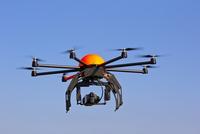-
CBP drones may be armed with non-lethal weapons
Customs and Border Protection (CBP) currently has eight Predator drones used on the northern and southern borders, and two more drones watching the Caribbean. The drones are equipped with high-tech cameras. Critics say drones are not an efficient way to monitor the border, and that they lead to few arrests and seizures. Other critics are worry about something else: a recent CBP report show that the agency is considering arming these drones with “expendables or non-lethal weapons designed to immobilize [targets of interest].”
-
-
NSA revelations raise doubts about passage of cybersecurity legislation
U.S. officials say the revelations about the National Security Agency’s(NSA) domestic surveillance programs could make it harder for lawmakers to pass a cybersecurity bill. Critics of the House cybersecurity bill, known as the Cyber Intelligence Sharing and Protection Act (CISPA), which was passed earlier this year (it is still being debated in the Senate), argued the bill could lead to private information falling into the hands of the NSA.
-
-
Documents show NSA conducted surveillance of EU member states, embassies (updated)

European politicians issued indignant warnings Sunday to the United States that U.S.-European relations may suffer as a result of revelations that the National Security Agency (NSA) spied on European governments and their embassies in Washington, and on European Union (EU) offices. The revelations were contained in documents, dated 2010, which Edward Snowden took from Booz Allen. Observers note that the revelations are not exactly news, since it has always been assumed that the United States spies on the activities of foreign diplomats – even those representing allies — in the United States. It has also been assumed that the United States was conducting surveillance of major countries and international institutions. Moreover, at least seven European Union member states – the United Kingdom, Denmark, the Netherlands, France, Germany, Spain, and Italy — have formal agreements with the United States to provide communications metadata to the NSA. “There’s a certain schadenfreude here [in Europe] that we’re important enough to be spied on,” a senior European official said. “This was bound to come out one day. And I wouldn’t be surprised if some of our member states were not doing the same to the Americans.”
-
-
Documents show NSA conducted surveillance of EU member states, embassies
European politicians issued indignant warnings Sunday to the United States that U.S.-European relations may suffer as a result of revelations that the National Security Agency (NSA) spied on European governments and their embassies in Washington, and on European Union (EU) offices. The revelations were contained in documents, dated 2010, which Edward Snowden took from Booz Allen. Observers note that the revelations are not exactly news, since it has always been assumed that the United States spies on the activities of foreign diplomats – even those representing allies — in the United States. It has also been assumed that the United States was conducting surveillance of major countries and international institutions. Moreover, at least seven European Union member states – the United Kingdom, Denmark, the Netherlands, France, Germany, Spain, and Italy — have formal agreements with the United States to provide communications metadata to the NSA. “There’s a certain schadenfreude here [in Europe] that we’re important enough to be spied on,” a senior European official said. “This was bound to come out one day. And I wouldn’t be surprised if some of our member states were not doing the same to the Americans.”
-
-
U.K. increases intelligence agencies’ budget to counter terror threat
George Osborne, Chancellor of the Exchequer, will today announce the government’s spending plans for FY 2015-16. The U.K. agencies responsible for fighting terrorism — MI6, MI5, and Government Communications Headquarters (GCHQ) — will see a significant increase in their combined £1.9 billion budget, an indication of the David Cameron government’s concern about the growing terrorism threat the United Kingdom.
-
-
Background check of Snowden may have been faulty
The Inspector General of the Office of Personnel Management (OPM) told lawmakers that a 2011 security reinvestigation of Edward Snowden’s background, conducted by a government contractor, may have been faulty. Later in 2011, OPM began investigating the contractor — USIS — for contract fraud. That investigation is still ongoing. The IG told the lawmakers that eighteen background investigators and record searchers — eleven federal employees and seven contractors — have so far been convicted for falsifying background investigation reports. Their abuses included interviews that never occurred, answers to questions that were never asked, and record checks that were never conducted, the IG said.
-
-
States move to draft their own drone laws

Advances in drone technology and drop in prices have led media and other organizations, and even private citizens, to purchase drones to do their own investigations. Several states have now drafted their own drone laws.
-
-
NSA chief: surveillance programs helped prevent terror plots more than 50 times since 9/11

The National Security Agency (NSA) and Justice Department on Tuesday offered a trenchant defense of the NSA’s surveillance programs. Gen. Keith Alexander, NSA director and commander of the U.S. Cyber Command, told lawmakers that the programs have helped prevent “potential terrorist events” more than fifty times since 9/11. Officials also offered a point-by-point rebuttal of the criticism of the program by civil libertarians, emphasizing that authorities, when they gather phone records, cannot immediately find out the identity or location of the callers.
-
-
Studying how journalists and private citizens use of drones
Newly published research offers a groundbreaking perspective on the controversial use of unmanned aerial vehicles in journalism and mass communication, or “drone journalism.” Until now, there has been no formal research and academic writing on the use of smaller drones by news organizations and private citizens.
-
-
NYPD police chief Raymond Kelly criticizes NSA for secrecy surrounding surveillance program
NYPD commissioner Raymond Kelly yesterday pointedly criticized the secrecy surrounding the National Security Agency (NSA), saying that Americans would probably be comfortable knowing their conversations are monitored. Kelly also said that if Snowden is correct in his allegations that the surveillance system can be readily abused, then there is a need for more oversight of the NSA. He said that more transparency about the checks on and supervision of what NSA analysts can monitor would help put the public at ease.
-
-
GOP lawmakers want stronger border security provisions in immigration bill
A border security amendment to the immigration reform bill, offered by Senator Chuck Grassley (R-Iowa), was defeated by a 57-43 vote last Thursday. Republican senators who supported Grassley’s amendment said they were concerned about a repeat of the 1986 scenario: the Reagan administration pushed through Congress an amnesty for illegal immigrants then residing in the United States, but without bolstering security along the U.S.-Mexico border, prompting millions of illegal immigrants to cross the border in the following decades. Several GOP lawmakers are offering their own border security amendments to the immigration overhaul bill.
-
-
NSA director: surveillance programs prevented “dozens” of terror attacks
Gen. Keith Alexander, the director of the National Security Agency (NSA) and commander of the U.S. Cyber Command, told lawmakers yesterday (Wednesday) that the NSA’s electronic surveillance programs have been indispensable in thwarting “dozens” of terrorist attacks on targets in the United States and abroad. He told the senators that securing a “cyber arena” could be done without infringing upon the privacy rights of Americans. “We do not see a tradeoff between security and liberty,” Alexander said, later adding, “We are trying to protect Americans.”
-
-
ACLU files lawsuit challenging NSA's phone surveillance
In the wake of the past week’s revelations about the NSA’s surveillance of phone calls, the yesterday American Civil Liberties Union (ACLU) filed a lawsuit charging that the program violates Americans’ constitutional rights of free speech, association, and privacy.
-
-
Lawmakers criticize NSA leaker Edward Snowden

Lawmakers were quick to criticize Edward Snowden, the 29-year old Booz Allen Hamilton employee who disclosed the NSA surveillance program to the Guardian and the Washington Post. House Intelligence Committee chairman Mike Rogers (R-Michigan) said the national security leaks would endanger American lives. Peter King (R-New York), chairman of the Homeland Security subcommittee on Counterintelligence and Terrorism, said of the leaks: “This is a matter of extraordinary consequence to American intelligence.”
-
-
Edward Snowden, an NSA contractor employee, says he is the source of NSA leaks
Edward Snowden, a 29-year-old former technical assistant in the CIA and more recently an employee of the defense contractor Booz Allen Hamilton, has identified himself as the source of the leaks about three massive NSA surveillance schemes. Snowden says the NSA’s surveillance activities are all-consuming; these activities “are intent on making every conversation and every form of behavior in the world known to [the NSA].” He said that once he concluded that the NSA’s surveillance scheme would soon be irrevocable, it was just a matter of time before he chose to act. “What they’re doing” poses “an existential threat to democracy,” he said.
-
- All
- Regional
- Water
- Biometrics
- Borders/Immig
- Business
- Cybersecurity
- Detection
- Disasters
- Government
- Infrastructure
- International
- Public health
- Public Safety
- Communication interoperabillity
- Emergency services
- Emergency medical services
- Fire
- First response
- IEDs
- Law Enforcement
- Law Enforcement Technology
- Military technology
- Nonlethal weapons
- Nuclear weapons
- Personal protection equipment
- Police
- Notification /alert systems
- Situational awareness
- Weapons systems
- Sci-Tech
- Sector Reports
- Surveillance
- Transportation
Advertising & Marketing: advertise@newswirepubs.com
Editorial: editor@newswirepubs.com
General: info@newswirepubs.com
2010-2011 © News Wire Publications, LLC News Wire Publications, LLC
220 Old Country Road | Suite 200 | Mineola | New York | 11501
Permissions and Policies
Editorial: editor@newswirepubs.com
General: info@newswirepubs.com
2010-2011 © News Wire Publications, LLC News Wire Publications, LLC
220 Old Country Road | Suite 200 | Mineola | New York | 11501
Permissions and Policies
